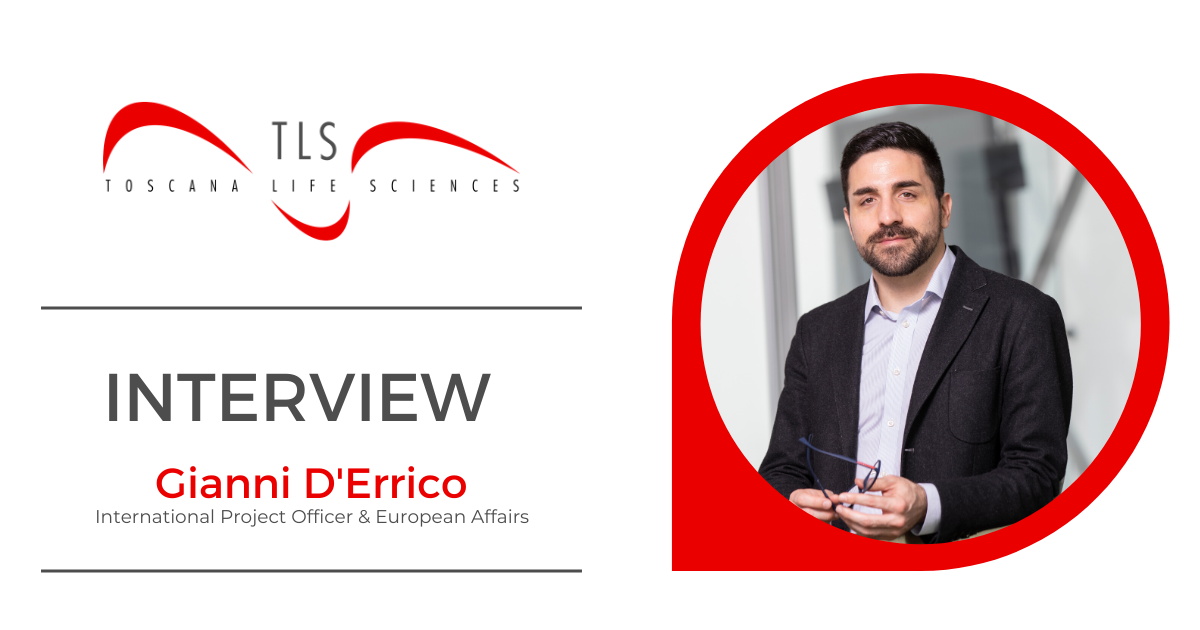Interview to Gianni D’Errico, Toscana Life Sciences, coordinator of the R4PM Project
The ongoing process of digitalisation and, specifically, the increasing availability of healthcare data, can support new ways of promoting health, as well as reshape health systems, by facilitating the transition towards patient-centred models and new integrated care structures.
The European Commission and International Health Authorities (e.g. World Health Organisation – WHO) are increasingly recognizing the crucial role of regions in embracing and implementing sustainable personalised health policies and have as main objective to bring regional needs to the attention of policy makers at European Level. This is the main idea underlying behind the Regions4PerMed European Project, which is coordinated by Toscana Life Sciences.
The first Key Area addressed by the project – on which partners from 4 different countries (Italy, Germany, Spain and Poland) collaborate – has been Big Data in Healthcare. A Report summarizing the main discussions held during the Thematic Conference and Workshop in 2019 is now available.
Innovation in science and technology can transform health systems and improve outcomes for patients. We talk about this with Gianni D’Errico, International Project Officer & European Affairs at TLS and coordinator of the project.
- The project R4PM has recently realised the first Report on Personalised Medicine, with a main focus on the use of Big Data in Healthcare. What is it about?
The report is a detailed summary of all the discussions that have been carried out during the international conference and interregional workshop, dedicated to the role of data in the implementation of personalised health and medicine, which took place in May and September 2019 respectively.
The two events have seen the participation of a wide number of research institutions specialised on this subject at international level like Genomics England, Estonian Genome Center, Canadian Institute for Health Research, Istituto Italiano di Tecnologia and Fondazione Telethon; Institutional Authorities like the European Commission, the Italian National Health Institute (Istituto Superiore di Sanità), Regione Toscana, Regione Lombardia, Navarra Region; Universities like Politecnico di Milano, Chrete, Dresden and Pavia; University Hospitals like Niguarda and San Raffaele.
This document intends to be a way of giving back the community of researchers and policy makers, with whom we interacted and collaborated, the results of these efforts, which we hope can contribute to improve the network of infrastructures at the base of scientific research and clinical practice on one side, paving the way for the economic sustainability of health systems by easing the transition towards patient-centered approaches on the other.
In the final part of the report we drew a series of recommendations to European stakeholders for the adoption and sharing of basic principles around which coordination between European regions will have to be implemented.
- Which are the main topics emerged on this topic so far?
The first part of the project was focussed on role of health data and their (mainly regional) governance for the implementation of personalised medicine and health. We started with the Data because only a standardised, interoperable and accessible collection process allows researchers to conduct comprehensive studies and find causal interferences of pathologies, as well as to investigate risk factors for clinically homogeneous sub-groups of people and elaborate and to evaluate targeted prevention strategies. On the other side, data allows healthcare systems to reshape based on the increasing information on the citizen’s health and to take value-oriented decisions (value-based healthcare) with a focus on long-run financial sustainability.
- What does “data” mean in the context of personalised medicine?
Data can be intended as any piece of information useful to provide a greater knowledge on the evolution of the health status of a person, potentially during through the whole life of people. This includes biological samples, health and clinical data stored in electronic health records, behavioural lifestyle data, environmental, territorial and urbanistic data – the list could definitely be longer. All this contributes to the understanding of the impact that different factors have on the health status of a person and suggests which therapeutic strategies shall be adopted. It is therefore a priority to invest on 4 main areas so that data can become a valid instrument in support of clinical decisions: deep understanding and data stewardship programs; data governance and interoperability; models validation and interpretability.
- After one year and a half since the beginning of the project, what is the state of the Regions4PerMed activities?
Until the lockdown imposed by the need to contain Covid-19 outbreak, the project had achieved the expected results. We had a great level of r from the scientific community and European policy makers, meaning that the focus of Regions4PerMed is well perceived at international level. Besides the two reports that have been developed – the first on the state of the art at the beginning of the project and the second one on big data and governance – we managed to establish a continuous interaction with many European regions (Tuscany, Lombardy Andalusia, Navarra, Baden-Wuerttemberg, Basilicata, Sicilia to name a few) which decided to formally collaborate by being part of our interregional committee.
- What about Strengths and Weaknesses?
As a main success I can name the commitments and involvement of experts in the field (scientists, Physicians and researchers) and policy makers who are increasingly interested in the topics we cover and in the results we reach. Between other important (collateral) milestones I can name the capability of scientific publication which is characterizing the project – we have 3 articles already published in peer-reviewed journals, one which is being reviewed and a fifth on the list.
Another strength is the constant support we receive from the members of our advisory board in providing direction and indications on content. This interdisciplinary group gives a unique value to our events and documentation.
It is also relevant to mention our tight collaboration with the IC-PerMed consortium. This is the primigenial project and to us it represents an important forum for discussion in order to implement valid and efficient actions. Regions4PerMed has, in fact, become a more and more credible partner, bringing relevant point of views, which are complementary to the action of the consortium.
A weaknesses could be the difficulty in setting-up a widespread distribution between regions (real focus of the project) in Europe. To reinforce this point, we intend to review and update our communication strategy in order to improve the performances of the project.
- Considering the ongoing emergency, due to the spreading of SARS-CoV-2 coronavirus, what will change in the approach of personalised medicine and which are the new opportunities in terms of big data?
We want to tackle this point with a position paper we are developing with the help of our Advisory Board. I personally think that this pandemic has highlighted the global need of sound and reliable digital infrastructures. If public authorities could have already count eon well-organised and interoperable data platforms and on personalised medicine tools, it would have been easier to better understand the geographic evolution of the virus, as well as to plan precision public health interventions based on the clinical framework of patients subgroups, often characterized by multi-morbidities and vulnerability conditions. To this end, those moving towards personalised medicine approaches are certainly advantaged to face such emergencies.
- Considering the ongoing emergency, due to the spreading of SARS-CoV-2 coronavirus, what do you think about resuming the activities, in particular for this type of projects, for which updating events and the creation of new relationships is fundamental?
The measures that have been undertaken to contain the outbreak have certainly impacted the working method behind Regions4PerMed, mainly based on technical conferences, workshops and continuous relations with stakeholders.
Nevertheless, as we might face long periods of social distancing before a progressive return to a “new normality” and in order to avoid delays in the project, we have decided to explore new ways possibility of conducting online conferences and workshops. We are working closely with our Polish partners to cooperate with specialised agencies which, besides adequate technological platforms, can also provide us an additional service of artistic direction. This would help us to not lose the value of formal and informal interaction (e.g. the typical conversation held during a coffee break) which has always been the key factor of such events. For the rest, the project was already using digital tools to coordinate the work between European partners and will continue doing so by boosting the means at our disposal.




